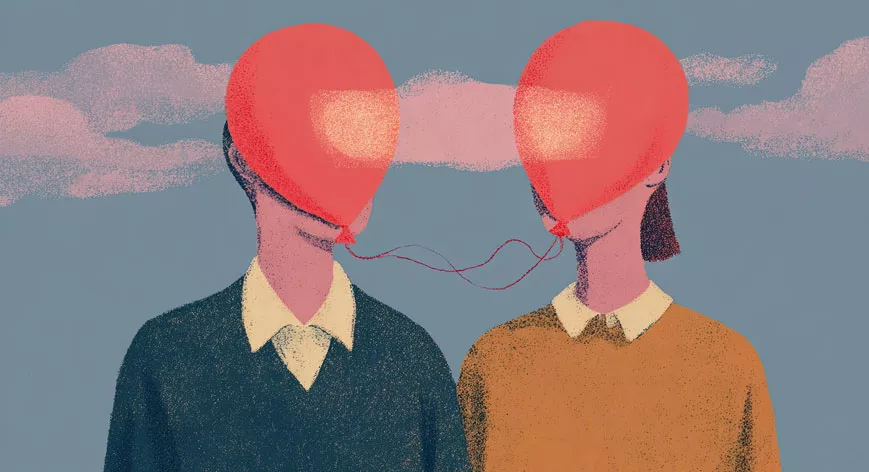Expat Depression and Relationship Problems - Surviving Mental Health Challenges in the Middle East

Expat Depression and Relationship Problems - Surviving Mental Health Challenges in the Middle East
When Mental Health Challenges Your Relationship - A Guide for Couples in the Middle East
It's 2 am and you are scrolling through your phone while your partner is sleeping. You are wondering whether your anxiety is slowly destroying the relationship you've worked so hard to build.
Or maybe you're watching your spouse struggle with homesickness and depression, feeling helpless as they withdraw from the life you were both dreaming of building when you decided to leave everything and everybody 'back home'; when you decided to start your 'new life' here in the Middle East.
If you're nodding along, take a deep breath. You're not alone in this struggle, and you're definitely not the first expat couple to face these challenges in the Middle East.
I can personally relate. Forty years ago, I arrived, young, newly married, husband working endless hours, no family nearby, feeling lost, and desperately alone. Needless to say my marriage did not survive.
Today, I help expat couples navigate these same challenges and rebuild connection whilst they are settling for a new life in the Middle East. So whether you are based in Dubai, Abu Dhabi, Doha or Saudi, support is available.
The Hidden Struggle of Expat Mental Health

Living as an expat in the Middle East brings unique joys—the adventure, career opportunities, tax benefits, and incredible cultural experiences. But let's talk about what nobody mentions in those glossy expat guides: the mental health challenges that can quietly erode even the strongest relationships.
Amara, a Lebanese-American client living in Abu Dhabi, described it perfectly: "Back home, I had my mom, my best friend, my therapist I'd seen for years. Here, I have my husband, and when depression hits, I feel like I'm drowning him along with me. The cultural stigma around mental health makes it even harder to reach out."
Does this sound familiar? When you're thousands of miles from your support network, managing visa stress, navigating cultural differences, and possibly dealing with the isolation that comes with expat life, mental health challenges don't just affect you—they ripple through your relationship in ways that can feel overwhelming.
What's Really Happening Behind Closed Doors

Let me share what I see in my practice with couples throughout the GCC. These scenarios might feel painfully familiar:
The Homesickness Spiral: Your partner misses family gatherings, can't find their comfort foods, and feels culturally displaced. Depression creeps in, and suddenly they're criticizing everything about your new life—including you for bringing them here.
The Expat Anxiety Overload: Between work visa renewals, kids' school applications, and constant cultural navigation, anxiety becomes your unwelcome third roommate. You find yourself snapping at your partner over small things, then feeling guilty, then anxious about feeling guilty.
The Cultural Pressure Cooker: Maybe you're from a culture where mental health discussions are taboo, making it nearly impossible to name what's happening. Your partner feels shut out, you feel misunderstood, and both of you are walking on eggshells.
The Identity Crisis Connection: Who are you in this new country? As you struggle with your changing identity (especially if you had to give up your career to follow your spouse), your relationship becomes a casualty of your internal confusion.
The Middle Eastern Context: What Makes It Different

Living in the Middle East as an expat couple presents unique challenges that your friends back home likely do not understand (at least that's what I personally felt). The cultural emphasis on family privacy, varying attitudes toward mental health, and the transient nature of expat communities can make seeking help feel daunting.
Dr. Sue Johnson, creator of Emotionally Focused Therapy, explains that "our attachment system—our ability to reach for and respond to our partner—becomes disrupted when we're under chronic stress." Now imagine that stress multiplied by visa uncertainties, cultural adaptation, and being far from familiar support systems.
Khalil, a Palestinian engineer in Kuwait, shared: "In my culture, we don't talk about feeling depressed. But the isolation here, missing my family, working long hours—it all built up. My wife started to feel like she was living with a stranger."
When Love Feels Lost in Translation
Perhaps you're the partner watching someone you love struggle with adjustment depression, and you're thinking, "I moved here too, why can't they just adapt like I did?" Or maybe you're the one drowning in homesickness while your partner seems to be thriving, leaving you feeling guilty and more isolated.
These feelings are valid. Cross-cultural relationships in expat settings face additional layers of complexity. What looks like rejection might actually be cultural differences in expressing distress. What feels like criticism might be your partner's way of processing their own cultural displacement.
Your Roadmap to Healing Together in the Middle East
The encouraging news? Relationships can not only survive these challenges—they can emerge stronger and more connected.
Here's your step-by-step guide to rebuilding that connection:
Step 1: Create Your Cultural Safety Net
Have an honest conversation about what's happening, acknowledging both your mental health struggles and the cultural context.
Try phrases like: "I notice that when I'm feeling homesick, I tend to..." or "The pressure to appear successful as expats is affecting me because..."
Step 2: Build Your Local Support Network

You don't have to navigate this alone. Consider individual therapy with a culturally competent therapist, couples counselling with someone who understands expat life, or joining expat support groups. It will be important to seek support from professionals based in the Middle East and who specialize in cross-cultural relationships and expat mental health.
Step 3: Establish Your Emotional Check-in Ritual
Create weekly "culture and connection" conversations where you both share how you're adjusting, what you're missing from home, and what you need from each other. This isn't about fixing—it's about understanding.
Step 4: Celebrate Your Brave Choices
Did you have a difficult conversation about missing home without it turning into a fight? Did you support each other through a visa stress without withdrawing? These victories matter enormously in your expat journey.
The Questions You're Probably Asking
"Should we consider moving back home while working on our mental health?"
This is a deeply personal decision. Many couples find that addressing the mental health challenges first, with proper support, helps them make clearer decisions about their future.
"How do I explain our struggles to family back home who think we're living the dream?"
You don't owe anyone a glossy version of your life. Consider phrases like: "We're working through some adjustment challenges, and we'd appreciate your support rather than advice right now."
"Is it normal to feel this lost in our new country?"
Absolutely. Culture shock, reverse culture shock, and ongoing cultural adjustment are real phenomena that affect mental health and relationships.
Moving Forward with Cultural Awareness and Hope
Remember, seeking help isn't admitting that your expat adventure has failed—it's taking the brave step toward creating the life you actually want, not just the one that looks good on social media.
Your mental health challenges don't define your relationship's future in the Middle East. With understanding, culturally appropriate support, and the right tools, you can build something even stronger than what you had before.
What matters most is that you're here, reading this, caring enough about your relationship to seek answers. That tells me everything I need to know about your capacity for love, resilience, and the courage it takes to build a life together in a new culture.
You're not just surviving your expat experience—you're learning to thrive, together, in one of the world's most dynamic regions.
I remember struggling to find a therapist back in 1989. The profession had not made it to the Labor Office List and it was hard. I was lucky enough to meet a couple of people who managed to help me.
Today, the region is embracing mental health preoccupation and there is less stigma around looking for emotional support.
Ready to begin your healing journey? As a trauma-informed Mental Health Coach and offering Relationship Therapy, I provide a safe space where your experiences are validated and your healing is prioritized.
Book a free confidential introduction consultation to explore how you can be supported along your path forward.
About the Author
Evelyne L. Thomas is an experienced Mental Health Coach and multicultural Couples Therapist and Coach based in Dubai specializing in cross-cultural relationships, interfaith marriages, and expat family dynamics.
With experience supporting couples for over 10 years and over 40 years-experience of living and working in the UAE, she brings cultural sensitivity and holistic healing approaches to Mental Health and Relationship Therapies in the region. She works with English & French speaking clients online worldwide or in person in Dubai.
All cultures, all backgrounds, all love stories are welcome.
Further Reading
"Hold Me Tight" by Sue Johnson - The most popular translation of EFT principles for couples, focusing on creating secure emotional bonds through understanding attachment needs and cycles of disconnection.
Never Miss a New Journal Entry
Join the newsletter to stay up to date on the latest from the blog and get answers on mental health and relationships.


.jpg)





